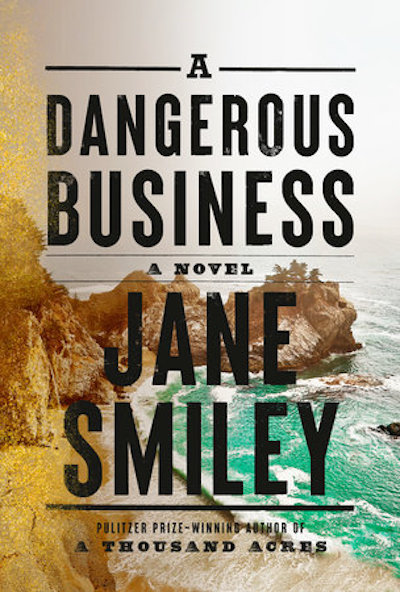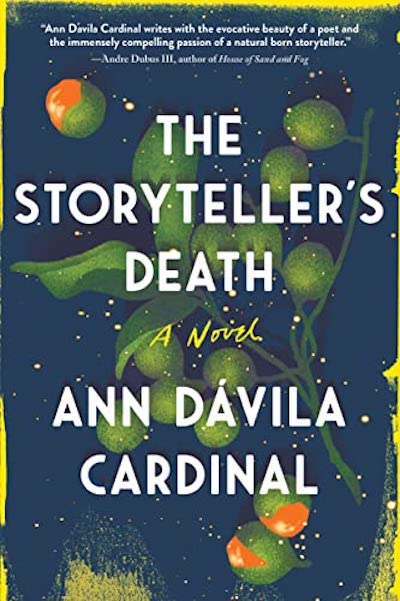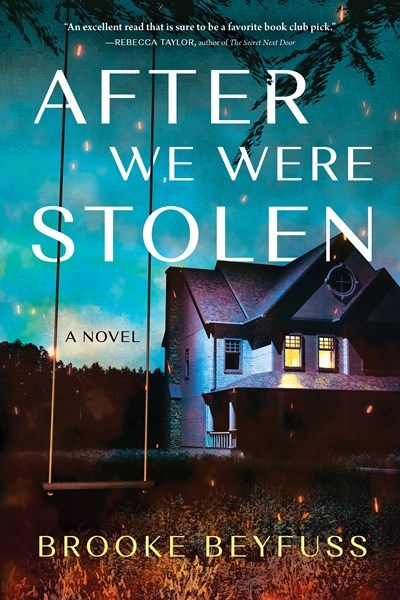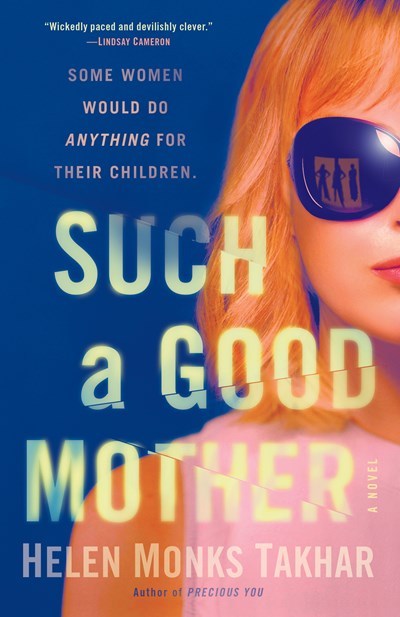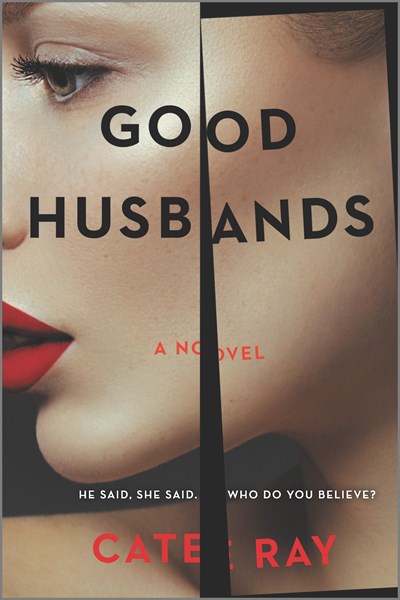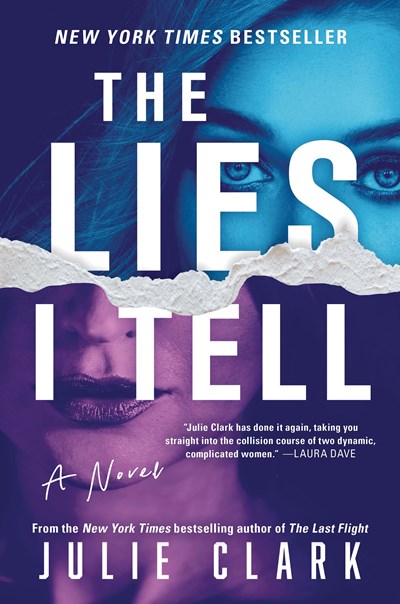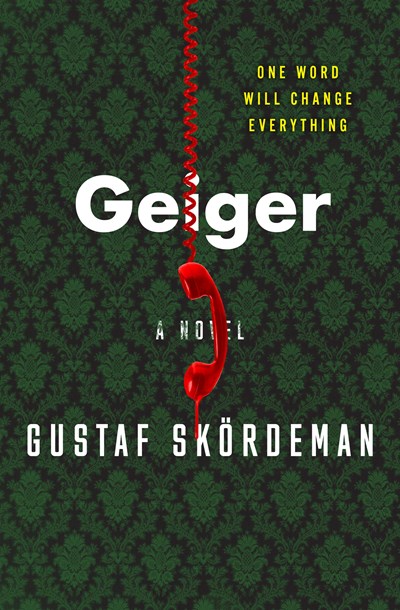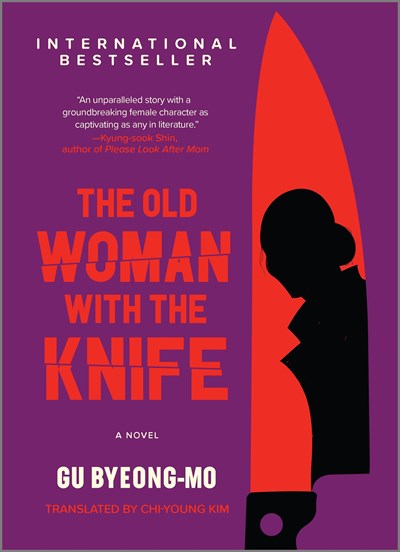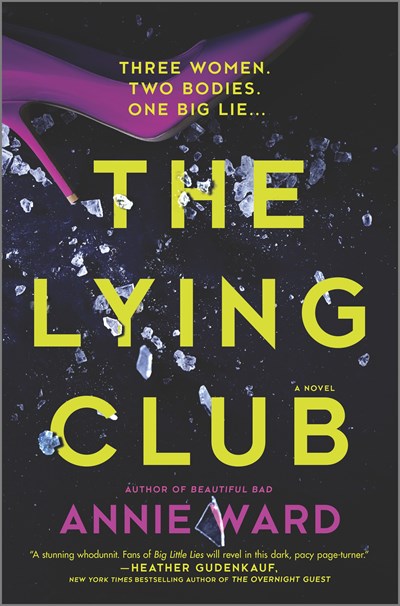Few know that one of Jane Smiley’s earliest works, published in 1984, was a mystery called Duplicate Keys set in contemporary Manhattan. Here, Smiley returns to crime fiction, although now we are in a completely different locale: Monterey in the mid-19th century. Eliza Ripple moves from Kalamazoo to Monterey with her husband, who promptly gets killed in a bar fight, leaving her broke and unemployed—but hardly sad at her piggish husband’s demise. Days later she’s recruited by Mrs. Parks to join her brothel, and with no other resources, agrees. Mrs. Park runs a tight ship: the women see only one or two clients a day; have physical protection, in the form of a bouncer; and are able to ban men they deem risky. Throughout the book, it’s women who keep each other safe, whether through friendships or the environments they create. And for the first time in her life, Eliza has financial security. All is as well as can be expected until Eliza realizes that young women in Monterey are disappearing, and discovers their bodies in a creek outside of town. She pairs up with her buddy Jean, also a sex worker and quite likely a lesbian—she’s got a terrific wardrobe of menswear—and the two women use every resource they have, from their clients to Edgar Allen Poe’s stories of detective C. Auguste Dupin, to discover who is murdering the women of Monterey. Smiley takes time to describe the wild west and the magical beauty that surrounds her characters. But ever present is the vulnerability that women face and the need to take matters into their own hands.
Women
Fraught connections between different worlds hold together this coming-of-age tale: connections between Puerto Rican families in the United States and their homeland; between the past and the present; between the real world and one made of stories. As the book opens, its shy protagonist, Isla Larsen Sanchez, is visiting her mother’s native Puerto Rico. Back in New Jersey, “everyone [looks] so colorless, like the underbelly of a fish,” but at least there she can do her own thing. The island, however, is overflowing with color but also with cheek-pinching aunts who expect proper behavior from a young lady with “not one drop of blood…that is not European.” Over the years, as she spends every summer in Puerto Rico, Isla comes to realize that her oh-so-pure blood may have given her…well, she’s not so sure it’s a gift. She sees visions of tales the cuentistas, storytelling women in her family, have told her—but only after their deaths. When one story involves a murder, and Isla finds that she can be physically hurt by weapons in the visions, readers find themselves dropped into a combination of magical realism, terror, and mystery, all wrapped in a shroud of family secrets and dubious honor. This rich story about stories can work as a crossunder, meaning it can be enjoyed by young adults as well as adult readers; Toni Morrison fans will particularly enjoy the otherworld-tinged drama
Avery lives outside in a tent while her family sleeps inside. Over the years, she’s learned to start her own fires; sometimes it doesn’t work and she’s freezing and hungry, but things aren’t much better for her nine siblings inside. Their parents, cult leaders preparing the family for when they’re the only ones left on Earth, emphasize toughness over all else. The children get their hopes up when the parents announce a buddy system, but it turns out that your buddy is the one who will be punished if you leave, so escape seems unthinkable. Avery finds a way out, though, accompanied by her little brother Cole, only to discover that they’re famous in the outside world as victims of years-ago child abductions. What happened the night the pair escaped and how they will navigate notoriety and society’s expectations are mysteries that will keep readers rapt. Also engrossing are the overwhelming emotions involved with both staying and going, the realization that just because the biggest problem is over doesn’t mean everything is rosy, and the ways tormented people treat one another even when survival is no longer at stake. Avery has grit and attitude to spare and will stay with readers long after the last page.
Rose O’Connell’s never been confident. At her downmarket English school, she was bullied as “Rotten Rosie” after her father was publicly disgraced. While her life has since improved, her husband struggles to find work and they’re deep in debt. Then she gets her son, Charlie, into The Woolf Academy, an exclusive school in the rapidly gentrifying neighborhood she grew up in. In fact, it’s her old school, but it’s now completely unrecognizable, as is the house she grew up in, where Amala Kaur, the CEO of the new school, lives. Woolf Academy seems too strict with Charlie yet indulgent of the other children, and while Rose is determined to do whatever it takes to help her son, she quickly finds that the mean girls she faced years ago have nothing on the circle of snooty women in charge here. It’s complicated and confusing when things begin to thaw and Rose is invited into the inner circle after the mysterious death of one of its members; slowly readers will begin to wonder if there’s anything she won’t do to please Amala and her ice-queen clique. By the time Amala wants something that made me gasp out loud—just the first of several gut-punching twists—it seems too late for Rose to salvage her marriage, her career, and even her sense of self. For readers of mean-girl titles and those who enjoyed The Hawthorne School by Sylvie Perry.
Una Kelly is a pickpocket in 1883 New York City, artfully dodging the police and turning her loot over to the head of her pickpocket ring, the quietly ruthless Marm Blei. Una is saving her pay to leave this miserable life, but it’s slow going, so she chances a side gig—selling a trinket she steals rather than turning it over to Marm. This puts her at the site of a murder, and now she’s accused and on the run. Her unusual hiding place—one of the country’s first nursing schools, at Bellevue Hospital—is the intriguing, politics- and emotion-laden setting for most of the book. Only educated ladies are accepted as nurses, but Una is neither schooled nor genteel, and faking both. Her nervous, always-on-your-toes code switching will be familiar to immigrant readers as well as anyone who’s reached for something out of grasp, and heavy doses of realism are thrown in as Una fights bullies while making a great friend and even finding romance. Skendandore’s (The Second Life of Mirielle West) intrepid heroine continues investigating the crime she’s accused of, too, making the book a thoroughly enjoyable and compelling medical history, mystery, and romance. Side benefit: a look at attitudes toward the then-emerging science of blood transfusion.
Bath, England strangers Priyanka, Stephanie, and Jess each receive the same letter telling them that their husbands together raped a woman decades before, with the letter writer, Holly, claiming to be the daughter of one of the men. The women think that confronting their husbands will be the end of the story. (That’s if they decide it’s true and if they can bring themselves to tell the men that they know about the rape, neither of which they find a given at all.) The husbands, too, think their troubles are over. They’re still members of the same upmarket social club where Holly says the crime took place, and still lead fine lives, unlike the victim and her daughter, with the mother now dead and the daughter near death from alcoholism. As the women meet one another and move from emotional paralysis to action, we’re brought to what seems like a definitive showdown. But it’s not the end at all. Ray’s U.S. debut reminds readers, through her storytelling and her portrayal of the women’s undulating emotions, that sometimes what we think will be the end might not even be the most significant part of the story; these women make their own ending, and it includes a startling closing twist. The sadness of lives destroyed is palpable here, but so is the healing force of friendship, not to mention determination. Psychological thriller fans who enjoy strong women characters should add this to their reading plans.
Meg (as she’s currently called) knows now that she was born to be a scammer, but she didn’t always know it. It took losing her childhood home to a con artist, then living in her car and going on dates to get food, to wake her up to her dubious talents. Now she’s a pro at the long game, tricking men into letting her clean out their bank accounts before she hits the road, on to the next mark. Sometimes she hurts others along the way, such as Kat Roberts, a journalist who’s now on Meg’s tail, hoping to get revenge as well as success by breaking a high-interest story about a female con artist. But the plan isn’t as smooth as Kat hopes. Kat begins to like Meg and maybe even trust her. Adding complication, Kat’s boyfriend is also a scammer, a gambling addict who uses distractions, fake outrage, and even-more-fake promises when he’s caught, only to do it all again. Kat, and the reader, don’t know who’s at fault and whom to trust when she notices her bank statements missing and other red flags. The roller coaster story here, coupled with the fear and uncertainty endured by Kat as she learns to trust again only to be betrayed again, will stay with readers. And the facts of the various cons—this is virtually an instruction manual for fraud!—are fascinating. For those who like a story in which women fight back.
Talk about jumping right into the thick of the story. As Skördeman’s debut opens, a wife says goodbye to her visiting daughters and grandchildren, picks up the phone, and, hearing just the word Geiger, shoots her husband in the head. We have no idea why she would do this nor where she’s headed after immediately going on the run, and what unfolds is more bizarre than we could have imagined. It’s also much weirder than the Swedish public ever thought could happen to the victim, a beloved TV presenter and jolly father figure known as Uncle Stellan. Espionage involving Sweden’s relationship with East Germany during the Cold War and after, and the relationship between Uncle Stellan’s spoiled, mean daughters and their childhood friend and bullying target Sara—now a police officer who elbows her way into the investigation—are highlights of this tale, as are the frequent head-spinning twists. Potential readers should note that child sexual abuse is a major plotline here. For fans of Elizabeth Elo’s Finding Katarina M., which also has echoes of a communist regime.
This startling work upends every stereotype of old ladies and killers. Known as Hornclaw, our protagonist is only 65 but welcomes the invisibleness of appearing elderly so as to better function as a disease control specialist: a hired killer. Under her baggy, mismatched clothes, Hornclaw has such a fearsome body that a TV producer at the gym asks her to be on a show about unusual people. But she fears being forced into retirement soon, a euphemism for being killed by the other specialists at the disease control agency. As we observe the abusive childhood that led Hornclaw to obsessively love her dog, Deadweight, but blithely kill strangers, we’re led toward a hairpin turn in her personality, when she finally cares for someone but it is part of a deadly trap. The story, which immerses readers into everyday life in Seoul, is made unforgettable by Gu’s language as she draws readers into the chilling, beautiful wanderings of Hornclaw’s mind, which flits from contemplating someone eating a peach (“she watches a perfect small world being smashed inside his mouth”) to considering the home of a newly butchered man (“the hallway to the living room seemed to loll like a dead person’s tongue”). For lovers of literary fiction and book clubs that will try something different.
The recent college-admissions scandal comes to mind when meeting the rich, competitive seniors of Colorado’s Falcon Academy High School and their even more fiercely cutthroat moms. Former friendships are thrown to the side when Mia and Sloane, best friends since grade school, both try for a soccer scholarship to UCLA. Their moms, who’ve spent countless hours together at soccer-pitch sidelines over the years, are increasingly at war too. It’s all eye-rolling entertainment for the staff at the school, who must please the moneyed families no matter how ridiculous their obsessions. Probably the most jaded by these mind games is Natalie, a secretary to the principal who has a front seat to the show and whose personal life is slowly being followed down the drain by her professional one. With so many dysfunctional characters and moral rollercoasters, readers won’t know whom to point at or root for when a body is found in the gym. Ward (Beautiful Bad, 2019) does a great job of portraying the disarray caused by meanness and greed, and when characters show unexpected sides, she deftly makes that switch. Note that there’s sexual abuse “off camera” here. For Liane Moriarty’s legions of followers.

